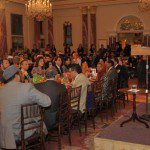 |
|
Ingrid’s conspiracy of 40,000
|
Only weeks before the annual conference of the Islamic Society of North America (ISNA), critics of the group (and of Muslims in general) were hurling a new accusation toward it – the awkward appellation of “unindicted co-conspirator” as described in a federal lawsuit against a Texas charity where the organization’s name surfaced. But with an organization that now crosses most of the American Muslim landscape, a connection between ISNA and any Muslim would be near impossible to avoid. Forty-four years since the umbrella group began its conferences in Chicago, the attendance list has swelled to over 40,000 people who collaborate and contribute from nearly every aspect of American Muslim life.
ISNA’s Shura council helps to provide guidance on fiqh matters, economic advice regarding the lucrative American Muslim demographic is provided and sought by Muslims and non-Muslims alike, and political collaboration with high-level US government representatives – unheard of 15 years ago – is now seen as a priority. Socially, the group promotes projects covering domestic violence, interfaith activities, and education – though you could be forgiven for viewing the annual conference as little more than one big party (more half the attendees are under 25 years old). Good timing, as there appears to be much to celebrate this year.
Non-Muslim religious and political leaders were in abundance, thanks in part to the efforts of Dr. Ingrid Mattson, the group’s groundbreaking female president. The president of the Union for Reform Judaism, Rabbi Eric Yoffie, addressed the crowd and received a standing ovation in response. “There exists in this country among all Americans,” remarked Yoffie, who pledged to continue working with the group, “a huge and profound ignorance about Islam.” The Rev. Jesse Jackson also made a surprise appearance (so unscheduled that he was placed as the fourth speaker in an environmentalism panel), where he called on the crowd to “fight for the civil rights of all, not just Muslims”. Democratic Party chairman Howard Dean concurred, insisting that Muslims “stand up and be heard” by running for office. To underscore his point, the first Muslim in Congress, Representative Keith Ellison (a Democrat, not surprisingly) stood by his side.
However, it was the governmental outreach – demonstrated this year by the presence of booths staffed by the Department of Justice, US Agency for International Development, and the Department of Homeland Security – that was irksome to some (though not all) conservative commentators. At least two members of Congress wrote a letter of protest, calling government outreach to Muslims at the event “absolute insanity” and accusing ISNA of “strong links to extremism.” Yet for the government officials present and scores of other attendees (the event was open to anyone paying the entrance fee), such links were non-existent. Conference topics included the importance of civic engagement in the larger American community, improving Sunni-Shia relations, women’s rights, and the environment.
The conservative protests come at a time when ISNA’s leadership is undergoing a dramatic transition in an attempt to become more dynamic and responsive. Along with the recruitment of more American-born and/or raised leaders, programs are being tailored to focus on domestic issues rather than the traditional foreign policy concerns. In an attempt to reach out to other metropolitan areas and broaden the organization’s reach, the conference will be moving to Columbus, Ohio next year after being held nearly every year in Chicago. And as for the “unindicted co-conspirator” label, ISNA isn’t taking it lightly, seeking an immediate retraction of the allegations. “ISNA is not now and has never been involved in any covert or illegal activity and has never supported any terrorist organizations,” explained ISNA Vice President Imam Mohamed Magid. “Rather, ISNA is an open and transparent membership organization that strives to be an exemplary and unifying Islamic organization.” These efforts were not lost on some British attendees who found the gathering less dogmatic, sectarian, or political than ones back home.
Conference attendees took the negative attention in stride, preferring to be inspired (perennial favorites Shaykh Hamza Yusuf and Imam Zaid Shakir from the Zaytuna Institute drew standing-room-only crowds) or commercially satiated by the convention’s 300+ bazaar vendors. Entertainment ranged from the ISNA-sanctioned show MC’ed by video blogger Baba Ali and featuring artists such as Kareem Salama and Dawud Wharnsby, to off-site (and non-endorsed) events such as the IMAN Community Café in southside Chicago with its “turntable dhikr” (remembrance of God) and hip-hop Muslim poetry, and the Muslim punk “Taqwapalooza” concert, held in a sweaty downtown residence complete with mosh pit. Hardly the Islamo-fascism some would have you expect.
With a hand in US government policy-making, an embrace of commercialism, and a nod to a still-developing American Muslim culture (and even counter-culture), ISNA is stretching hard to broaden its influence – and largely succeeding. Unlike many Muslim gatherings around the world, the ISNA conference, as with the group itself, has grown to become a relatively non-judgemental affair. Only time will tell if the organization gets the same from its critics in return.
Shahed Amanullah is editor-in-chief of altmuslim.com











